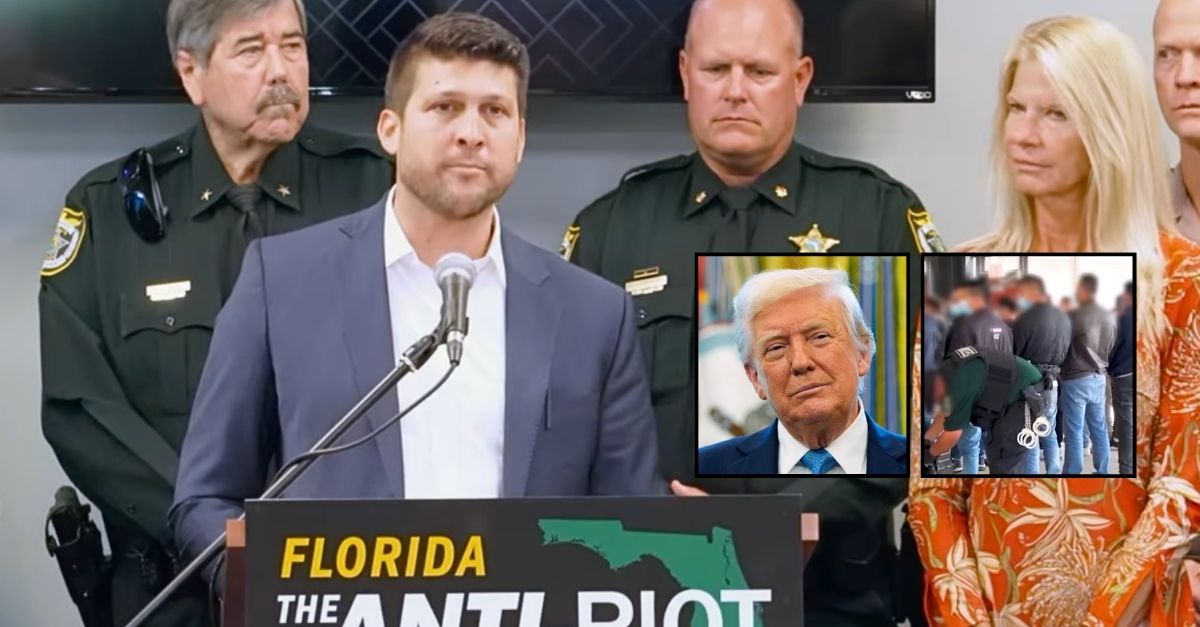
Background: Florida Attorney General James Uthmeier at a press conference on June 14, 2025 (AG James Uthmeier/Facebook). Left inset: President Donald Trump watches as Treasury Secretary Scott Bessent participates in a ceremonial swearing in of Paul Atkins as chairman of the Securities and Exchange Commission, in the Oval Office of the White House, Tuesday, April 22, 2025, in Washington (AP Photo/Alex Brandon). Right inset: U.S. Immigration and Customs Enforcement conducting a raid (Fox News/YouTube).
Florida Attorney General James Uthmeier spent his Fourth of July pushing back against immigration advocates in a filing to the U.S. Supreme Court, urging the justices to reject pleas to uphold a federal judge”s injunction blocking the state’s new immigrant enforcement law — a move Uthmeier blasts as a “remarkable power grab.”
“The district court extended its injunction to cover every Florida law enforcement officer even though they had not been sued,” Uthmeier said Friday in reply to a response brief filed by the Florida Immigrant Coalition, the Farmworker Association of Florida and two individual plaintiffs who are suing the state over the immigration law.
“Plaintiffs’ response carries forward the same mistakes as the district court,” Uthmeier blasted.
Love true crime? Sign up for our newsletter, The Law&Crime Docket, to get the latest real-life crime stories delivered right to your inbox.
Last month, the Florida AG asked the U.S. Supreme Court to step in and allow him to continue enforcing the new state law — known as SB 4-C, which criminalized the entry and presence in Florida of immigrants who have entered the United States illegally — after a federal judge blocked it with a preliminary injunction.
U.S. District Judge Kathleen Williams issued a 14-day stay blocking the law on April 4 after it was signed into effect by Gov. Ron DeSantis in February. The legislation and its enforcement has been a powder keg for controversy, recently resulting in Uthmeier being held in contempt of court.
The AG’s emergency Supreme Court application asserts that his state’s inability to implement the new law has left Florida exposed and vulnerable to the “evil effects of illegal immigration,” which he describes as “more than sadistic.”
When Williams — a Barack Obama appointee — ordered the legislation not to be enforced, she reasoned it was the federal government’s responsibility to apprehend and litigate migrants, not individual states. She extended her order on April 18, and then issued a preliminary injunction on April 29, noting how the new law was “likely” unconstitutional.
Attorneys for the immigration groups and two plaintiffs filed a 41-page response brief to Uthmeier’s Supreme Court application last Wednesday, urging the nation’s highest court to shoot down the request and keep Williams’ injunction in place temporarily. They argued that SB 4-C “conflicts with the intricate federal scheme at every turn,” citing a 2024 ruling in a Texas case that established a “comprehensive framework” on what penalties apply for those who enter the United States unlawfully, according to the groups.
More from Law&Crime: ‘Too speculative and conclusory’: Trump DOJ tells environmental groups suing over ‘Alligator Alcatraz’ construction to take in the ‘flora and fauna’ elsewhere
“Congress has provided a range of tools and broad discretion to federal officials in order to balance a range of national interests, yet SB 4-C seeks to wrest control of one of those tools — criminal regulation of entry — from federal control and discretion, to be applied however Florida (and, presumably, any other state) sees fit,” the groups said.
Uthmeier hit back Friday with rebukes of those suing Florida and Williams specifically, saying their arguments are based on “a brooding intuition that immigration, writ large, is inherently and exclusively federal in nature.” The views stated on the matter, Uthmeier said, leave no role for states to regulate immigrants in any capacity.
“By disagreeing that illegal immigration is a national crisis, plaintiffs underplay the reality on the ground, putting them squarely at odds with the past two presidents,” Uthmeier asserted.
“SB 4-C represents Florida’s commonsense effort to combat the flood of illegal immigration into its borders,” he added. “Plaintiffs and the district court insist that Florida was powerless to adopt that law.”
Condemning Williams’ injunction as a “remarkable power grab by a federal judge,” Uthmeier said the relief “imposed” on the AG the duty of ensuring that all other state officials comply, “even though under state law the attorney general exercises no control over these other officials,” according to his Friday reply.
“Plaintiffs endorse that approach, claiming that every officer in the state is ‘fully represented’ whenever a single state officer is named in the case,” Uthmeier said. “Hardly. Under Florida’s system of government, executive power is divvied up among other officials, the attorney general, local state attorneys, county sheriffs, and municipal police chiefs. Those officials are independent. Absent some special arrangement, one does not speak for or control the others, and vice versa. So by purporting to enjoin Florida’s law-enforcement officers (who have not been sued here) without affording them their day in court, the district court erred.”
Uthmeier argues that by blocking Florida from enforcing SB 4-C during the “potentially years-long” course of litigation, Williams’ injunction irreparably injures the state and causes harm that is “not merely abstract,” according to his filing.
“SB 4-C addresses the calamitous effects of illegal immigration in Florida, which threaten both the physical and financial wellbeing of the state’s residents,” Uthmeier said. “The injunction deprives the State of an important tool otherwise falling within its police power.”




